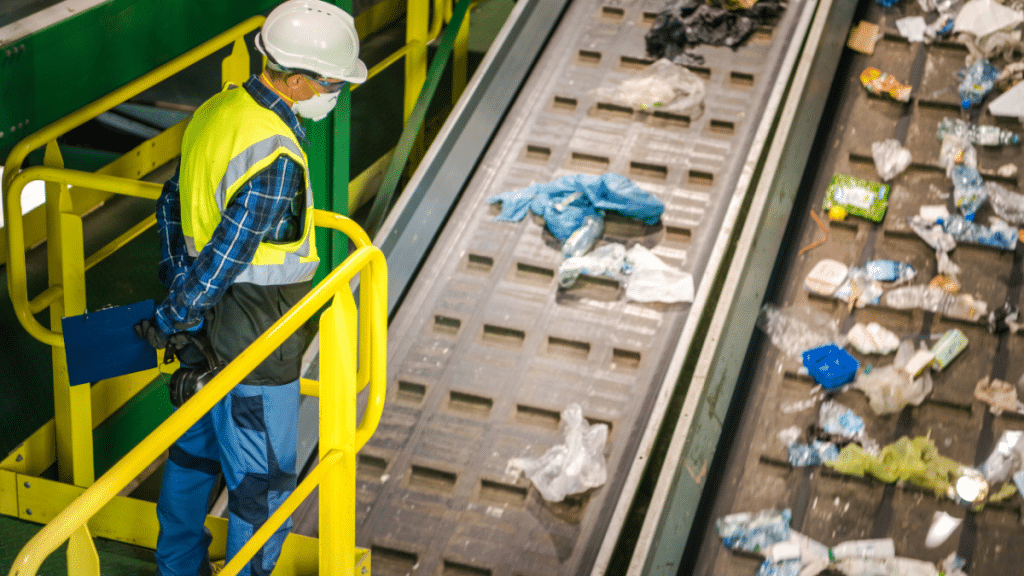Workplace safety is a priority for any company. Making sure that the work environment is safe not only safeguards employees but also enhances productivity and morale. One aspect of safety that is sometimes overlooked is how waste is handled properly. When waste management is done right, it can greatly reduce risks and create a safer workspace. Here are five practical ways to enhance safety by improving waste handling practices. Managing waste goes beyond just following regulations; it involves fostering a culture of safety and accountability. Employees should have the opportunity to work in a place where their well-being and safety are given priority.
Evaluate Current Waste Management Procedures
The initial step in improving safety is to evaluate your waste management procedures. Carrying out a waste audit helps in identifying risks linked to improper waste disposal methods. This audit includes analyzing the types of waste produced, how they are disposed of, and any challenges encountered during these processes.
Involving employees in this evaluation process is crucial as they are the ones dealing with waste on a daily basis and can offer valuable insights into existing issues. Engaging employees also encourages them to take ownership and responsibility for maintaining a safe work environment. Furthermore, conducting regular assessments and updates to this audit ensures ongoing enhancements.
Implement Efficient Waste Segregation
Efficient waste separation is crucial for maintaining a well-organized work environment. Sorting waste into categories like hazardous, recyclable, and general waste helps prevent dangerous substances from mixing with other types of waste. This approach not only simplifies the disposal process but also ensures compliance with regulations. Properly labeling and color-coding waste bins is essential for effective separation.
Clear labels make it easy for employees to identify the correct bin for each type of waste, reducing the chances of improper disposal. Regular training sessions on waste separation practices can reinforce these behaviors and keep everyone informed. Visual aids and posters placed around the workplace can serve as reminders, while occasional refresher sessions can help employees stay focused on waste separation practices.
Utilize Advanced Waste Handling Equipment
Using advanced equipment for handling waste can significantly enhance safety in the workplace. One such piece of equipment is the self-dumping hopper, designed to manage large amounts of waste with minimal manual effort. Self-dumping hoppers reduce the risk of injuries by minimizing the need for employees to lift heavy loads, thus making disposal processes more efficient and less prone to accidents. In addition to self-dumping hoppers, compactors, and balers are also useful tools.
These machines compress waste, decreasing its volume and facilitating easier management. Investing in such equipment not only boosts safety but also enhances overall efficiency in waste management. Automated systems can additionally lower the chances of errors. While the initial cost of equipment may seem high, the long-term benefits include savings in preventing injuries and improving waste management efficiency.
Establish Clear Waste Handling Procedures
Having clear and detailed waste handling procedures is crucial for ensuring safety. Developing standard operating protocols (SOPs) helps ensure that everyone understands the correct methods for managing waste. These SOPs should encompass all aspects of waste handling, from sorting and storing to transporting and disposing of it. Regular training sessions and practice drills help reinforce these procedures and ensure that employees are well-versed in them.
Assigning roles and responsibilities for waste management tasks further promotes adherence to these procedures. When everyone is aware of their duties, the entire system operates smoothly and securely. Properly documenting these procedures and making them easily accessible is also vital. Consistent implementation of these protocols throughout all departments minimizes the potential for accidents and mistakes.
Promote a Clean and Organized Work Environment
Maintaining an organized work environment is essential for ensuring safety. Implementing regular cleaning routines and inspections helps prevent waste buildup that could pose risks. Encouraging employees to keep their work areas tidy also contributes to a safer workspace. A clean environment reduces the likelihood of accidents by preventing slips, trips, and falls.
Creating an environment where employees feel valued and comfortable is essential. A tidy workspace not only ensures safety but also reflects the organization’s dedication to its employees’ well-being. Equipping employees with cleaning supplies empowers them to take responsibility for cleanliness. Acknowledging and rewarding cleanliness can inspire the team to uphold high standards.
Regularly Review and Improve Waste Management Practices
Regularly assessing and enhancing waste management practices is an ongoing task. Continuous reviews and adjustments guarantee that practices remain effective and compliant with regulations. Employee feedback plays a crucial role in pinpointing areas for improvement, offering firsthand experiences that help refine processes.
Staying informed about advancements in waste management technologies and regulations is essential for maintaining safety and efficiency standards. Engaging with industry professionals and attending workshops can provide fresh perspectives. Recognizing achievements in waste management can help sustain progress.
Conclusion
In conclusion, proper waste management is integral to workplace safety. By evaluating existing methods, implementing effective separation, using advanced tools such as self-dumping hoppers, setting clear guidelines, advocating for cleanliness, and routinely assessing procedures, companies can establish a work environment that is safer and healthier. Adhering to these approaches not only safeguards employees but also boosts overall efficiency and team spirit. Begin implementing these methods today and proactively contribute to a safer workplace. Remember, a secure work environment breeds productivity. Let’s prioritize the welfare of our staff and establish a benchmark for quality waste management.
